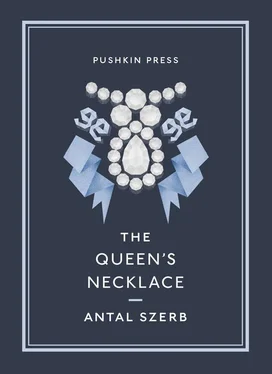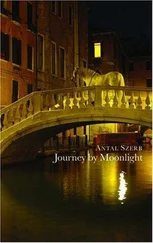In what happened next we see the more passionate side of Marie-Antoinette. She had always hated Rohan, and now the man had made her an object of suspicion and offended her deepest womanly pride by the assumptions he had made. That she might have met him in secret! That she could have asked him for money! No, such things would have been intolerable even to a bourgeoise, and as for this proud daughter of the Habsburgs, the first lady of the age … No, nothing could be allowed to bring Marie-Antoinette into disrepute. Here she could not be calm and considered: of course she insisted on a punishment that would be exemplary, resounding and spectacular. And, for once, even Louis XVI was moved to anger. He too had been wounded in his most sensitive point: in his capacity as a husband, where his feelings of inferiority were at their strongest.
It is now 15th August, Assumption Day, and Versailles has gathered to celebrate.
For centuries the day has been used to commemorate the moment when Louis XIII placed his crown and the monarchy under the protection of the Virgin. A huge crowd has come from Paris, some on horseback, some by carriage, some in those communal coaches known because of their rounded shape as pots de chambre .
In the morning a council of ministers meets in the King’s Cabinet Room. Present are the royal couple, Baron Breteuil and the Keeper of the Seal (that is to say, Minister for Justice) Miromesnil. Breteuil reads out the jewellers’ memorandum. Miromesnil, his voice quavering with echoes of the fairy godmothers, advises restraint and caution — they should think of the Rohan family. But Breteuil insists on the need to make an example. Hot-blooded and violent by nature, he is the sort of man who sees something in everyone that requires to be disciplined and brought to heel. His moral indignation provides a fine cover for his long-standing resentment of Rohan: he too has been insulted by the man, in Vienna. But Louis XVI leans towards Miromesnil’s view. He tells Breteuil to call the Cardinal in.
Rohan is present in the Palace, along with the rest of the aristocracy. As Grand Almoner he is waiting to take the celebratory mass. Summoned, he enters in full priestly regalia, a scarlet silk cassock with white English-lace sleeves.
“ Mon cousin ,” the King begins. “So what is all this about a diamond necklace you bought for the Queen?”
Rohan turns pale.
“Sire, I know now that I was duped, but I have deceived no one.”
“If that is the case, mon cousin , then you have nothing to fear. Nonetheless you must explain what happened.”
The King’s voice is gentle enough, but what is the King to Rohan? There sits Marie-Antoinette — to him nothing less than the embodiment of pride, anger and loathing. His knees start to shake; he is on the verge of fainting. The King notices this, and tells him to make a full statement in writing. He is left to himself.
In such a state of mind he finds it difficult to find the right words. Nonetheless he puts a few lines together: there is nothing for it now but to point the finger at the one who really is guilty, Jeanne de la Motte. The royal couple and the Ministers return. They want to know where are the documents signed in the Queen’s name. And they repeat what Cagliostro said: how could a prominent member of the Court possibly think that the Queen would sign herself ‘Marie-Antoinette de France ’? Only a flunkey would have believed that. Rohan replies that he will hand the letters over to the King and pay for the necklace. The King declares that, considering the circumstances, he will have to order his arrest and detention.
“I consider it necessary for the Queen’s good name,” he adds.
Rohan implores the King not to shame him before such a large number of people, and bring such disgrace on his family.
The King appears to be swayed by these words, but at this moment the Queen erupts. Her voice is loud and agitated, and as she is speaking she bursts into tears. She rounds on Rohan:
“How could you possibly imagine that I would write you a letter, when for nine years I haven’t been on speaking terms with you?”
Her words decide the matter.
Meanwhile, packed into the rooms outside, the magnificent courtiers are growing restless. The Mass should have begun long ago. People sense that something is in the air: there is an anxious murmuring — the crowd is breaking up into little groups — a sense of gathering storm. Finally Rohan emerges through the glass door, deathly pale. He is followed by Breteuil, whose face is flushed with pleasure at his great and unexpected revenge. In loud tones he calls out to the Captain of the Guard, the Duc de Villeroi:
“Arrest the Cardinal!”
Rohan now has to make his way along the endless succession of halls — to left and right, behind him and in front of him, the astonished French aristocracy, their individual features dissolving into one enormous face before his blurred eyes, the endless rows of mirrors seeming to spin as the sunlight crashes and roars down on him through the huge windows. And underfoot, grinding and crackling like shattered glass, the Ancien Régime itself.
The formal reception is due to be held further on, in the Hall of Mirrors, where a hundred years later the names of Teutonic Caesars will be loudly proclaimed and the sacred gloire of France humbled in the dust; there too, another fifty years on, will be signed the Treaty of Versailles, bringing peace with the Germans. Anyone can enter the Hall of Mirrors, and now it is crammed with people who have come at dawn for the celebrations. They look on in shocked amazement as the Duc de Villeroi hands the Cardinal — the illustrious prince of the Church, in his radiant ceremonial finery — over to Second Lieutenant of the Guard Jouffroy. In the long peaceful years of the previous two Louis such sights were seldom seen in Paris, Now even these superficial, garrulous and generally irreligious people are silenced by the nameless horror of it.
By some miracle Rohan has so far remained calm. In fact he is the only calm and controlled person in the whole vast multitude. In these moments of crisis and disaster, the resounding footsteps of his countless noble forebears are entering his soul, while those with no thousand-year legacy to speak of have lost their heads. Now, very calmly, he asks Jouffroy for permission to scribble a few words on a bit of paper which he rests on the scarlet rectangle of his Cardinal’s hat. He gives it to his attendant, says something to him in German, and the man rushes off. Then he is led away to a suite of apartments.
The following day he is taken to the Hôtel de Strasbourg where his papers are confiscated in his presence and the building closed off. But the red portfolio in which the “Queen’s letters” once lay amongst his private papers has vanished. The day before, the same attendant had galloped at breakneck speed back to Paris, to announce: “All is lost; they have arrested the Cardinal!”—before handing the slip of paper to the Abbé Georgel, and promptly collapsing. Georgel, however, did not collapse. He carried out the instruction he had received in the note and destroyed the correspondence.
On 17th August, chaperoned by Beugnot, Jeanne was a guest at Clairvaux, the famous convent named in memory of St Bernát. She was given a most gracious welcome by the Abbot, who knew that she was on particularly good terms with the Grand Almoner. They were just sitting down to dinner, having waited patiently for the Abbé Maury to arrive. (Maury was a famous pulpit orator who became Mirabeau’s great rival. It was after one of his sermon’s that Louis XVI remarked: “What a pity he didn’t say something about religion; then he really would have covered everything.”) Maury was due to give the special sermon in honour of St Bernát, but as he had not appeared, they sat down to eat without him.
Читать дальше












